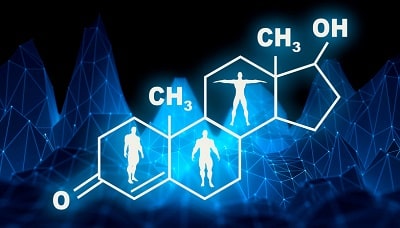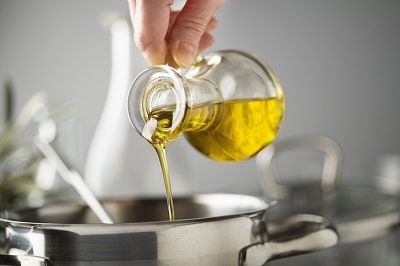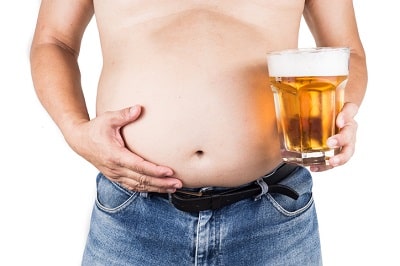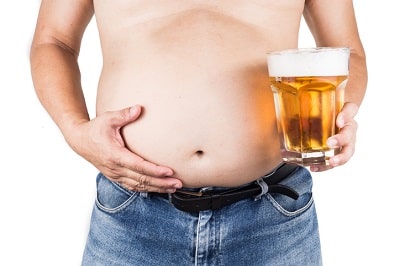If you’re a guy entering middle age, you have probably noticed a certain trend of growing bellies among you and your friends. This sort of fat accumulation around the abdomen has many nicknames – “beer belly,” “dad gut,” etc. Although we commonly chalk growing belly fat accumulation up to a natural aspect of the aging process, out-of-control belly fat actually indicates that our hormone system, which includes the crucial male sex hormone testosterone, is unbalanced.
In this article, we’ll discuss the relationship between testosterone and belly fat in men, what testosterone-killing foods you should avoid, what you can do to destroy belly fat naturally, and other alternatives for eliminating belly fat like testosterone replacement therapy (TRT).
Testosterone is Crucial for Male Sexual and Overall Health

A lot of guys are familiar with the benefits of testosterone for the bedroom, but testosterone’s role in the body goes well beyond supercharging sexual health for guys. In addition to testosterone’s role in boosting libido, raising sperm counts, and strengthening erections, the male sex hormone also fulfills the following activities:
- Promoting restful sleep.
- Optimizing energy levels.
- Erecting lean muscle mass.
- Fortifying bones.
- Fat metabolism.*
*particularly important for eliminating belly fat.
If you’re killing your testosterone levels with poor diet — including with the 5 testosterone-draining food items we’ll discuss later on — then you are endangering your health. Modifying your diet to include healthy choices that elevate testosterone levels naturally is guaranteed to improve your overall health and general sense of well-being.
The Connection Between Falling Testosterone and Higher Belly Fat in Men: A Vicious Cycle
 The human body is constantly in search of creating balance through a process called “homeostasis.” Part of this work includes balancing hormone levels. In an attempt to achieve homeostasis, “excess” testosterone is converted into estrogen through a process called aromatization. Normally, aromatization produces a more harmonious balance between the sex hormones. Sometimes, though, due to uncontrolled abdominal fat buildup, the process is broken.
The human body is constantly in search of creating balance through a process called “homeostasis.” Part of this work includes balancing hormone levels. In an attempt to achieve homeostasis, “excess” testosterone is converted into estrogen through a process called aromatization. Normally, aromatization produces a more harmonious balance between the sex hormones. Sometimes, though, due to uncontrolled abdominal fat buildup, the process is broken.
Belly fat has an enzyme called aromatase that catalyzes the conversion of testosterone into estrogen through a process called “aromatization,” resulting in lower testosterone levels.
Lower testosterone levels, in turn, cause further belly fat accumulation, creating a vicious cycle of spiraling testosterone levels and elevated belly fat levels. The cycle continues as more testosterone is converted into estrogen and more fat accumulates in the abdomen due to lower testosterone.
The only way to interrupt the cycle is boosting testosterone levels through a variety of means to eviscerate the visceral fat and restore systemwide balance.
The Hidden Dangers of Belly Fat
Belly fat might seem like an innocuous addition of a few pounds of fat. However, guys who have big bellies should be concerned about the ramifications of their gut fat on their overall health. Men with high belly fat concentrations are more likely to die young and as well as more likely to experience disability while they are alive. Here is why.
Visceral vs. Subcutaneous Fat: A Crucial Distinction
What many men don’t realize is that not all fat is the same. In the human body, there are two divergent types of fat with very different health implications. Subcutaneous fat, which accounts for as much as 90% of your total fat profile, is the type of fat we typically associate with being overweight. It is distributed throughout the body under the skin. In healthy people, any fat buildup resulting from excessive calorie supply is stored subcutaneously.
Visceral fat is the more dangerous type of fat that collects around the internal organs of the abdomen. Rather than being stored under the skin throughout the body like subcutaneous fat, visceral fat is stored in the abdominal cavity around vital organs such as the liver and intestines. Visceral fat is known colloquially as “abdominal fat” or “belly fat.”
Visceral fat accumulation, as seen in men with “beer bellies,” is correlated to poor heart health, elevated risk of developing diabetes, and lower life expectancy.
Visceral Fat Toxicity
Belly fat promotes an increased release of two types of cells called adipokines and cytokines. These cells, while performing important work in appropriate numbers, also trigger systemic, chronic inflammation. Inflammation – especially the kind of sustained inflammation generated by cytokines and adipokines – is linked to nearly every disease process known to modern medicine, including:
- Diabetes.
- Heart disease.
- Dementia.
- Cancer.
- Compromised immune response.
- Autoimmune diseases like Parkinson’s and multiple sclerosis.
The bottom line on visceral fat and health is that controlling inflammation through healthy lifestyle practices, diet modifications, and, potentially, through therapeutic treatment are arguably the best strategies that you can implement for your overall well-being.
The Top 5 Most Harmful Foods to Testosterone Levels
 Because of the close negative relationship between circulating testosterone in men and belly fat, increasing testosterone levels is one of the major strategies that any man who is serious about losing unwanted abdominal fat should employ.
Because of the close negative relationship between circulating testosterone in men and belly fat, increasing testosterone levels is one of the major strategies that any man who is serious about losing unwanted abdominal fat should employ.
Unfortunately, our modern American diet presents a dilemma: what we typically eat is horrible for our testosterone levels. We consume far too many empty calories that are devoid of any real nutrition. Our snacks are loaded with sugar, preservatives, and other additives. We do not get adequate protein levels, nor we do include enough fresh fiber-rich fruits and vegetables in our daily eating habits.
To understand the extent to which we have harmed our sexual health as men, we need to look no further than this startling statistic: in the past 40 years, men’s sperm counts throughout the West have dropped on average by 60%. Due to the close correlation between sperm counts and testosterone levels, we know that levels of the male sex hormone have bottomed out in men as well.
While there are several factors influencing the plummeting male sexual health of Western men, diet is clearly at the top of the list. Here are the top 5 foods to avoid to recover healthy testosterone levels.

Testosterone-Killer #1: Alcohol
Although no one likes to be the buzzkill, the reality is that excessive alcohol use is devastating for testosterone counts in men. Not only does it lower testosterone, but alcohol also affects sperm quality by interfering with the work of Sertoli cells in the testicles. Far from affecting male sexual health alone, alcohol also wreaks havoc on the wider endocrine system and negatively influences its critical interactions with the nervous and immune systems.
Your standard glass of wine at dinner is unlikely to severely hamper your testosterone gains. In moderation (defined by most experts as no more than 2 drinks per day), the deleterious effects of alcohol on your testosterone levels will likely be minimal. However, if you are serious about upping your testosterone levels naturally, then eliminating heavy drinking (more than 2 drinks per day) should be your top priority.
Testosterone-Killer #2: Spearmint and Peppermint
The mint family, while useful for treating a number of health conditions, is no friend to testosterone. Peppermint and spearmint’s testosterone-killing properties come from their high concentrations of anti-androgen compounds.“Androgen” is the biological term for male sex hormones.

Consuming even a small amount of peppermint or spearmint can result in substantial losses of testosterone. For example, in one study, rats regularly drank peppermint tea while the control group consumed only water. Following the administration of the tea, the peppermint-drinking rats had “statistically significant” drop-offs in testosterone levels.
Testosterone-Killer #3: Licorice Root
 Licorice root is a member of the bean family. Its scientific name is Glycyrrhiza glabra. Due to its unique flavor profile, its trademark scent is popular in teas and candies. One study discovered a remarkable 26% drop-off in testosterone levels among healthy male subjects in the study after eating 7 grams of licorice for a week.
Licorice root is a member of the bean family. Its scientific name is Glycyrrhiza glabra. Due to its unique flavor profile, its trademark scent is popular in teas and candies. One study discovered a remarkable 26% drop-off in testosterone levels among healthy male subjects in the study after eating 7 grams of licorice for a week.
Testosterone-Killer #4: Hydrogenated Vegetable Oils
In case you needed one more reason to retire trans-fat laden hydrogenated oils from your cupboard forever, here it is. Hydrogenated vegetable oils are well-documented to lower testosterone levels.
One way that hydrogenated vegetable oils harm testosterone levels is with their omega-6 fatty acid content. While omega-6 fats on their own are not harmful, the excessive omega-6 content of vegetable oils threatens to upset the delicate balance of omega-3 fatty acids (found abundantly in fish) to omega-6 fatty acids in the body. For optimal hormonal health, you should aim for a 1:1 dietary distribution of omega-3 and omega-6 fats.
Unfortunately, most Westerners take in an appalling 16:1 ratio of omega-6 to omega-3 acids. Removing the richest sources of omega-6 fats from your diet, including hydrogenated vegetable oils, is paramount to regain healthy testosterone concentrations in the blood.
Testosterone-Killer #5: Reishi Mushroom
 If you follow natural health circles, you may have encountered proponents of reishi mushrooms extolling the many health benefits of adding reishi mushrooms to your diet such as enhancing the immune system and lowering inflammation. Despite its impressive health-promoting activities, however, there is some evidence that reishi mushrooms may also lower testosterone by inhibiting the activity of the 5α-reductase enzyme.
If you follow natural health circles, you may have encountered proponents of reishi mushrooms extolling the many health benefits of adding reishi mushrooms to your diet such as enhancing the immune system and lowering inflammation. Despite its impressive health-promoting activities, however, there is some evidence that reishi mushrooms may also lower testosterone by inhibiting the activity of the 5α-reductase enzyme.
To safeguard against the potential anti-androgen effects of reishi mushrooms, avoid supplements that contain them as an ingredient and only include reishi mushrooms in your diet sparingly.
A Note on Soy: Does It Affect Testosterone Levels?
Soy contains undesirable amounts of phytoestrogens. Phytoestrogens are plant-based compounds that mimic the naturally-occurring female sex hormone estrogen. Phytoestrogens are categorized as “xenoestrogens,” meaning that they are estrogens sourced from outside the body. In high concentrations, xenoestrogens have been demonstrated to upset the balance of the hormone system and lower testosterone, especially when sourced through supplementation – for example, in the form of soy protein isolate.
The effects of getting soy through regular diet on testosterone, though, are not as clear-cut. One study found no correlation between dietary soy and testosterone levels.
As research fleshes out the exact nature of the relationship between soy and testosterone, you would do well to consider limiting soy intake, especially from supplements.
How Can Men Prevent Belly Fat Accumulation Through Dietary Adjustments?
Several tactics should make up your dietary strategy for fighting belly fat. First, lay off the alcohol. Although quitting the drink is easier said than done, putting down the bottle, or at least limiting alcohol consumption, is a critical component of any testosterone-boosting plan.
Eliminate or drastically reduce your intake of the testosterone-killing foods listed above as well as all processed foods. In terms of stripping harmful ingredients from your diet, you want to focus on getting rid of added sugar and chemical additives. This includes cutting out candy, instant noodles, chips, cookies, pastries, sodas, microwaveable meals, and cereals with added sugar.
What Foods Boost Testosterone Levels?
Replace the anti-testosterone food items listed above with more fresh fruits and vegetables (especially cruciferous vegetables like broccoli and kale), fish (for protein and high omega-3 content), and protein-rich nuts and beans.

When planning your new testosterone-fortifying diet, emphasize flexibility so that you can stay committed to it. The web is full of great meal plans to effectively boost testosterone, but one of the easiest to start is called the Whole30© diet plan that focuses on simple meal preparation using only whole-food ingredients.
How Can Lifestyle Habits Affect Belly Fat?
In addition to modifying your diet to include more whole foods, you need to incorporate regular physical exercise in your daily routine to see the sustainable upticks in testosterone that you want.
Any type of exercise is beneficial for hormone health, but weightlifting is especially potent for elevating testosterone counts in sedentary men. Finally, you should be getting at least 7-9 hours of sleep each night. Your hormone system takes advantage of the downtime during sleep to regenerate crucial hormones and rebalance itself. Without adequate sleep, your hormone health declines, including testosterone levels.
Testosterone Replacement Therapy for Melting Belly Fat
In many cases, lifestyle and dietary adjustments on their own are adequate to achieve restoration of falling testosterone levels to optimal blood concentrations. For some men who do not respond as favorably to diet and lifestyle changes, though, testosterone replacement therapy (TRT) may be a good option. TRT involves the titrated subcutaneous (under-the-skin) administration of synthetic testosterone to augment the body’s natural supply. Nearly all men respond favorably to treatment, seeing and feeling results in as little as a few weeks.
Men with low testosterone levels who undergo TRT report higher energy levels, supercharged libido, and improved mental health. If you do contemplate TRT, seek care from a qualified, licensed professional. Receiving therapy from a responsible provider who monitors your health throughout the process protects you against any adverse effects of treatment as well as against any harm resulting from substandard testosterone supplies sourced from questionable producers.
The Bottom Line on Diet, Belly Fat, and Male Sexual Health
When it comes to making the necessary testosterone-friendly changes to your diet, the good news is that it’s possible to eat well (you can still load up on juicy steaks!) without all the added sugar and processed foods in the typical American diet.
If you don’t want to be that guy with a diet-induced “dad bod,” complete with potentially harmful belly fat, then you should consider upping your testosterone levels naturally through diet modification, more active and health-oriented lifestyle practices, and possibly through hormone replacement therapy.

